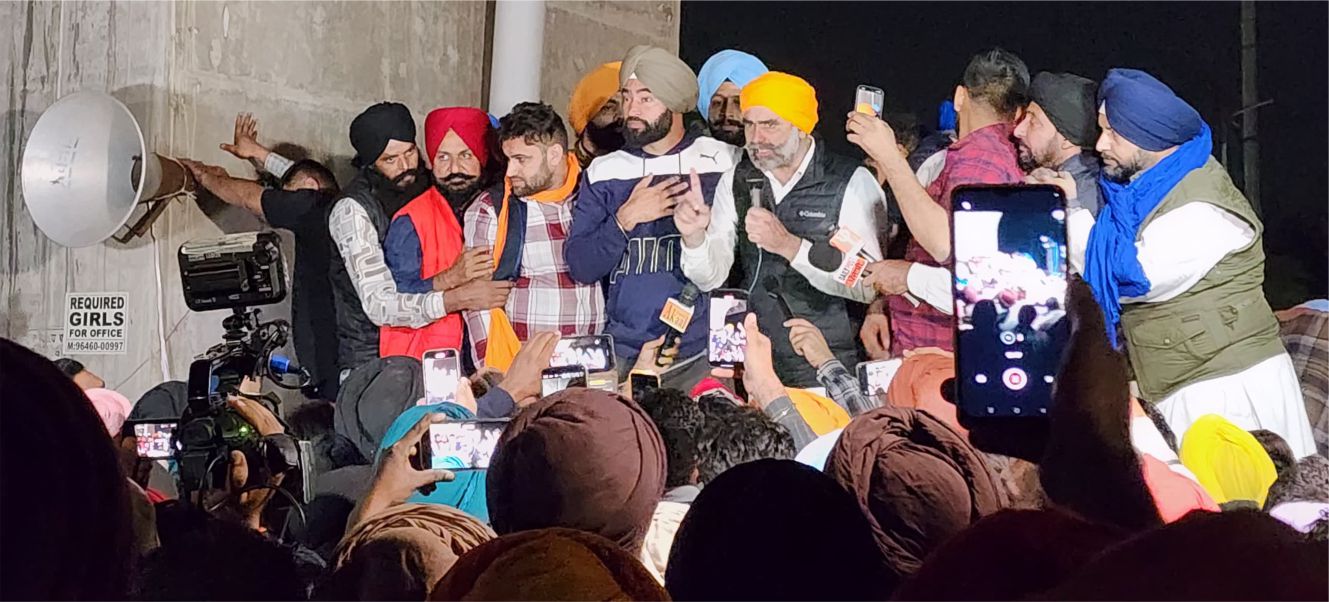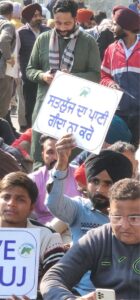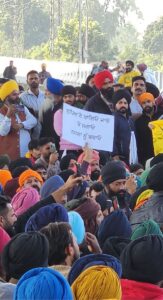From the Punishment of “Kala Pani” to the “Kala Pani Frontline”
The Budha Dariya (old river) has now turned into the Budha Nala (a polluted drain), pouring chemical-laden, toxic wastewater from Ludhiana’s factories into the Sutlej River. This contaminated water is spreading diseases like cancer and hepatitis across a significant portion of Punjab’s Malwa region. To stop this catastrophe, leaders of the Public Action Committee (PAC) recently organized a massive gathering at Ludhiana’s Verka Chowk. This assembly, supported by numerous environmental activists and organizations, aimed to block the effluents from the nearby dyeing industrial units. Despite government efforts to disrupt the protest by arresting its leaders, the gathering turned out to be a major success. The protestors blocked roads and eventually ended the demonstration after receiving assurances from the administration late at night. Here’s a special report by Ishwinder Singh Dakha, a correspondent for World Sikh News, who was present at the protest site.
![The Budha Dariya (old river) has now turned into the Budha Nala (a polluted drain), pouring chemical-laden, toxic wastewater from Ludhiana’s factories into the Sutlej River. This contaminated water is spreading diseases like cancer and hepatitis across a significant portion of Punjab’s Malwa region. To stop this catastrophe, leaders of the Public Action Committee (PAC) recently organized a massive gathering at Ludhiana’s Verka Chowk. This assembly, supported by numerous environmental activists and organizations, aimed to block the effluents from the […]](https://www.theworldsikhnews.com/wp-content/uploads/2024/12/Kale-Pani-Protest-Slider-360x267.jpg)
The people of Punjab have endured immense sacrifices for India’s independence—suffering through countless hardships, prison terms, and even the severe punishment of “Kala Pani” (penal transportation). Yet, they could never have imagined that one day they would face a similar “Kala Pani” punishment right in their own homes, and that they would have to fight for liberation of clean waters.
On 3 December, environmental activists from the Public Action Committee (PAC) called for an assembly to block the Budha Nala, which was once the pristine Budha Dariya. The famous Verka Chowk of Ludhiana became the “Kala Pani Frontline” for the day.
To thwart the protest, the government began arresting PAC leaders early in the morning. Social activists like Kuldeep Singh Khaira, Dr. Amandeep Singh Bains, and Lakhbir Singh Lakha Sidhana were arrested even before they could reach the protest site. In a dramatic move, police chased Lakha Sidhana’s car, smashing its windows. Simranjit Singh Mann, president of Shiromani Akali Dal (Amritsar), was placed under house arrest, and Bapu Tarsem Singh, father of MP Amritpal Singh, was arrested and allegedly mistreated by the police. Additionally, hundreds of environmental activists traveling from Rajasthan were detained at Abohar and Bathinda, and a group of women activists from Chandigarh faced the same fate.

Despite these challenges, a large number of environmentalists managed to reach Verka Chowk, which had been transformed into a police stronghold. The police began indiscriminately arresting anyone they suspected of being a protestor, including bystanders. Some media journalists intervened to rescue protestors from police custody. A particularly commendable act was when journalist Jagdeep Singh Thali of Punjabi Lok Channel ensured the return of a protestor’s turban, which the police had removed during his arrest.
Due to the absence of key leaders, the protestors began blocking roads on their own. Eventually, PAC members Amitoj Mann and Gurkirat Singh managed to reach the site covertly by 2 PM. They addressed the gathering, urging unity and perseverance. Leaders from various organizations, including Ajaypal Singh Brar from the Misl Sutlej, Professor Mahinder Pal Singh and Harpal Singh Baler from the Shiromani Akali Dal (Amritsar), also addressed the gathering.
 Under Amitoj Mann’s leadership, the protestors broke through a police barricade at Verka Chowk and marched towards Tajpur Road to block the Budha Nala. However, they were stopped at another barricade near Gurdwara Nanaksar, where they staged a sit-in, blocking the road. Nihang Singhs were also present there and volunteers from Gurdwara Alamgir Sahib organized langar for the protestors.
Under Amitoj Mann’s leadership, the protestors broke through a police barricade at Verka Chowk and marched towards Tajpur Road to block the Budha Nala. However, they were stopped at another barricade near Gurdwara Nanaksar, where they staged a sit-in, blocking the road. Nihang Singhs were also present there and volunteers from Gurdwara Alamgir Sahib organized langar for the protestors.
Senior officials, including the Police Commissioner and ADC, promised to convey the protestors’ demands to the government. The protestors, however, remained firm in their demand to block the Budha Nala. Eventually, the administration requested two days to close the CETP at Bahadurke and a week to take legal action against other violators. After securing the release of all detained leaders and protestors, the demonstration was called off. Late at night, PAC leaders arrived at Verka to thank the participants and prepare them for future protests if the promises were not fulfilled.
Why do political leaders, who make lofty promises before elections, blatantly abandon them once in power? Chief Minister Bhagwant Singh Mann, who once vowed to clean the Budha Nala, now stands with those polluting it, while openly challenging those trying to clean it.
Days before the protest, factory owners responsible for discharging untreated effluents into the Budha Nala, threatened to confront the demonstrators. On the day of the protest, these owners transported migrant workers in vehicles to the Budha Nala, providing them with new clothes, food, and entertainment in an attempt to create conflict between them and the protestors.
AAP Rajya Sabha member and renowned environmentalist Baba Balbir Singh Seechewal was conspicuous by his absence.
 AAP Rajya Sabha member and renowned environmentalist Baba Balbir Singh Seechewal was conspicuous by his absence. Many had hoped he would take steps to clean the Budha Nala, much like he had rejuvenated the Kali Vein. The Budha Dariya, like other rivers and rivulets in Sikh history, holds immense significance. Its polluted waters eventually flow into the Sutlej, which is historically tied to Guru Gobind Singh Ji’s first Amrit ceremony. The Guru’s teachings emphasize the sanctity of water, making its preservation a fundamental duty.
AAP Rajya Sabha member and renowned environmentalist Baba Balbir Singh Seechewal was conspicuous by his absence. Many had hoped he would take steps to clean the Budha Nala, much like he had rejuvenated the Kali Vein. The Budha Dariya, like other rivers and rivulets in Sikh history, holds immense significance. Its polluted waters eventually flow into the Sutlej, which is historically tied to Guru Gobind Singh Ji’s first Amrit ceremony. The Guru’s teachings emphasize the sanctity of water, making its preservation a fundamental duty.
Why do political leaders, who make lofty promises before elections, blatantly abandon them once in power? Chief Minister Bhagwant Singh Mann, who once vowed to clean the Budha Nala, now stands with those polluting it, while openly challenging those trying to clean it. The Pollution Control Board remains a silent bystander. Do these leaders and factory owners not need clean water themselves? Have power and greed blinded them completely?
The Budha Nala’s water is a major contributor to the high incidence of cancer and hepatitis in Punjab’s Malwa region and Rajasthan. Newborns are being born with cancer or severe disabilities, and many couples are now unable to conceive naturally. This is directly linked to Punjab’s deteriorating air and water quality.
Water is a basic necessity for all living beings, yet polluted water is now causing death and disease. The Budha Nala’s water is a major contributor to the high incidence of cancer and hepatitis in Punjab’s Malwa region and Rajasthan. Newborns are being born with cancer or severe disabilities, and many couples are now unable to conceive naturally. This is directly linked to Punjab’s deteriorating air and water quality.
The lack of involvement from Ludhiana’s residents, the most affected by the Budha Nala, was a concern.
While it is often lamented that Punjab’s Hindu community does not stand with the state’s issues, this protest saw notable participation from them. However, the lack of involvement from Ludhiana’s residents, the most affected by the Budha Nala, was a concern. People need to understand that this fight is not about any one caste, creed, or religion—it is a collective battle for survival. Clean air and water are shared resources, and until we unite to protect them, these issues will remain unresolved.
